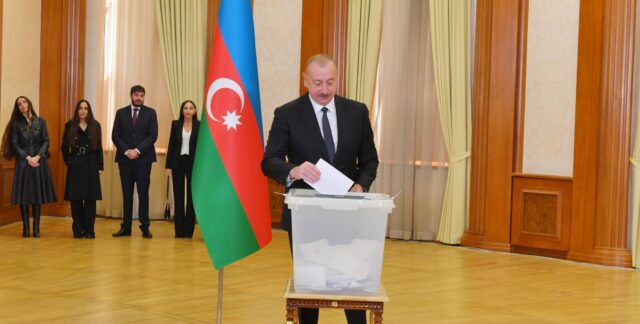
Aliyev Wins Snap Presidential Election
Publication: Eurasia Daily Monitor Volume: 21 Issue: 27
By:

Executive Summary:
- Azerbaijani President Ilham Aliyev called for snap presidential elections to be held on February 7, citing the need for fresh elections following the restoration of the country’s territorial integrity over Karabakh.
- Aliyev faced little competition as he is perceived as widely popular after playing a leading role in restoring Baku’s full sovereignty over Karabakh.
- The president’s new term is expected to focus on the Armenian-Azerbaijani peace process, opening the Zangezur Corridor, and recalibrating foreign policy—with a possible shift toward closer ties with Central Asia, the Persian Gulf region, and East Asia.
On February 7, Azerbaijan held early presidential elections that were initially scheduled for 2025, when the seven-year term of President Ilham Aliyev was supposed to end. The Azerbaijani government moved the date forward to December 2023, setting February 7 as the date for the early elections (Azertag, December 7). Numerous reasons have been speculated by observers both inside the country and abroad about the reasons behind this decision. One significant pattern that has emerged in this context is related to the fact that it was the third major election in a row in Azerbaijan that had been rescheduled to an earlier date after the 2018 presidential and 2020 parliamentary elections.
This year, the decision to call the elections earlier took place in a specific context following the conflict in Karabakh in September 2023. This was particularly highlighted by Aliyev himself when he elaborated on the reasons for early elections on January 10 (President.az, January 10). Characterizing the restoration of the country’s territorial integrity as “the beginning of a new era” for Azerbaijan, he underscored it as the first primary reason for the snap elections. The second reason the President articulated is also related to this sentiment. “I thought that the first elections to be held across the entire territory of our country should be the presidential elections,” he said, adding that “If we were to hold this election on time, i.e., in April 2025, then municipal elections would be the first to be held. I thought that would not be right.” Celebrating the historical significance of the elections being the first to be held in the Karabakh region, Aliyev and his family voted in Khankandi in the Karabakh region (Apa.az, February 7).
Another reason Aliyev rescheduled the elections was to capitalize on his strong popularity in the country following the Karabakh conflict. His opponents in the elections, mainly the members of the parliament, did not have much popular support to challenge Aliyev. This reality probably affected the decision of some other opposition parties, including the Republican Alternative (REAL), not to join the race, leading Aliyev to have no strong competition.
On February 11, the Central Election Commission declared Aliyev emerged victorious, securing 92.12 percent of the votes (4,567,458) (Azertag, February 11). Other candidates, including other opposition parties, including REAL, congratulated Aliyev, with no domestic political group challenging the results. Following the elections, a series of world leaders, including President Charles Michel of the European Council, Chinese President Xi Jinping, and Russian President Vladimir Putin, congratulated Aliyev (President.az, February 8).
Aliyev’s renewed presidential term is expected to be dominated by a series of political and economic tasks and challenges. Above all, as he announced on January 10, in his interview with local TV channels, the Armenia-Azerbaijan peace process would continue to top his government’s agenda (President.az, January 10). In early February, it was reported that analysts at Fitch Solutions (part of the Fitch Group) believe that Azerbaijan and Armenia may sign a peace treaty in the first half of 2024. “We think it highly likely that a peace deal will include provisions for greater Azeri control over the creation of the Zangezur corridor,” the assessment of the agency stated (Fitch Solutions, February 2024). A breakthrough in the talks over the Zangezur corridor is primarily seen as imperative to make a peace treaty possible (See EDM, January 24).
In foreign policy, the country will likely pivot more to its partners in Central Asia, the Gulf region, and East Asia. Following disagreements that appeared in relations between Baku and some Western capitals, exemplified by Azerbaijan’s departure from the Parliamentary Assembly of Council of Europe on January 24 and the warnings and calls for sanctions against Azerbaijan by some European officials, Baku may be more interested in diversification of its foreign policy (Azertag, January 27; Trend.az, January 31). Although Aliyev has repeatedly denied any intention or preparations to invade southern Armenia, Baku was again warned by some European officials in January, including Josep Borrel, High Representative of the European Union, against any violation of Armenia’s territorial integrity (Azatutyun.am, January 23). This was coupled with Baku’s concerns against the activities of the European Union’s monitoring mission in Armenia, which Baku has accused of being used as a propaganda means against Azerbaijan. At the same time, the Armenia-Azerbaijan border has been unprecedently stable and peaceful since September 2023 (Qafqazinfo.az, February 12). These dynamics in the relations may bring about some fundamental policy changes in Azerbaijan’s foreign policy in the years to come under the new presidential term of Aliyev.
President Ilham Aliyev’s victory in the snap presidential elections on February 7 reflects the stability of his leadership. Azerbaijan has undergone significant geopolitical shifts, particularly with the resolution of the Karabakh conflict. The decision to hold early elections was strategically timed to capitalize on the momentum generated by the restoration of Azerbaijan’s territorial integrity. With an overwhelming majority of votes in his favor, Aliyev’s new term is poised to address various domestic and international challenges. The ongoing Armenia-Azerbaijan peace process remains a top priority, with hopes for a peace treaty in the near future. Additionally, Azerbaijan is expected to recalibrate its foreign policy, seeking closer ties with regional and Asian partners while navigating complex relationships with Western capitals.



